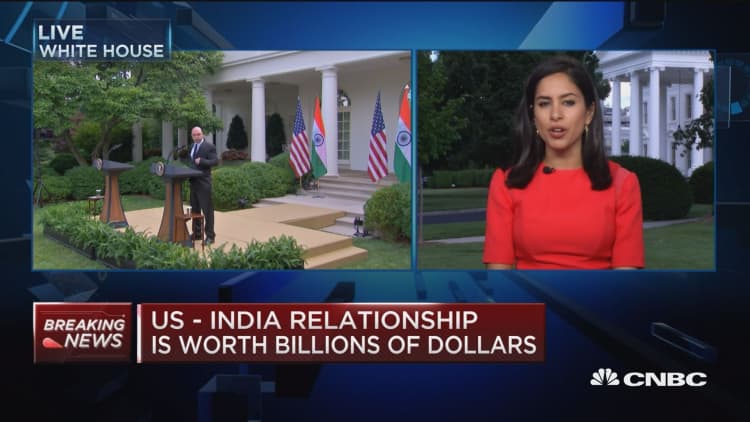When Indian Prime Minister Narendra Modi comes to Israel next week (July 4), for a historic first visit of a government leader from the subcontinent, he does so against a background of booming business ties between the two countries, particularly in the field of defense.
Israeli companies, led by government-owned aerospace giant Israel Aircraft Industries, have signed arms deals totaling over $2.6 billion so far in 2017 alone. Israeli businesses are also active in other fields in India including in agriculture, water and pharmaceuticals, but the arms deals remain the most eye-catching.
Eli Alfassi, IAI's executive vice president for marketing, in a telephone interview with CNBC emphasized the breadth of the ties.
"Not everything is starting and ending in defense activities, there are more areas. I think the cooperation between the two countries is very important and strategic to both."
India is IAI's most important arms market. Total trade between the two countries was close to $4.2 billion in 2016. It's a far cry from the $200 million, mainly diamonds according to the Indian embassy's website, in 1992, when the two countries formally established relations amidst Israeli-Palestinian peace moves.
Initially, ties were very much defense-driven, with India facing domestic terrorism, a perennial rivalry with Pakistan, with which it has fought several wars, and sometimes uneasy relations with China.
Israeli arms exports to India, as to most other countries, were "threat-driven", Daniel Flesch at consulting firm Avascent, told CNBC. But that may be changing now, as the Modi visit exemplifies: "India in particular was really a threat-driven market and it's showing a normalization of defense relations."
The Modi visit signals an opening to a more strategic partnership, said Flesch, with cooperation growing on a range of other issues, also outside the field of defense.
Yet, the huge arms deals of earlier this year show that defense remains a vitally important component of the relationship. The sales concern missile air-defense systems, an area on which the countries have long cooperated. The vast bulk of these contracts is with IAI, with another considerable chunk going to Israel's Rafael Advanced Defense Systems.
"The meaning of the recent deal is that now the Indian armed forces have chosen this air defense system for the three services," said IAI's Alfassi. The most recent deal, inked in May this year, was for a missile system for India's navy.
The deals have long-term implications, said Alfassi: "The meaning of this project is that IAI and other Israeli companies will be active in India for years to come." Apart from the missile systems, IAI also sells drones and other equipment to India.
Israel and India have been cooperating on defense, including missile systems for years but under Modi's Make in India policy, which encourages local manufacture and research, the nature of this cooperation is likely to shift to ever more Indian input.
"With this program we're 100 percent implementing the policy of Prime Minister Modi of Make in India. Even before this initiative we started developing and producing together with dozens of subcontractors in India who're producing parts and systems and subsystems of this MRSAM [Medium-Range Surface-to-Air Missile] system in India," said Alfassi.
The new projects will mean a further shift, he said: "From the next batch, which is for the navy, the lead integrator for the system will be an Indian company, Bharat Electronics Ltd., a governmental company. Until now IAI was the lead integrator, we were responsible for the installation of the system."
With that kind of cooperation India will acquire actual Israeli defense expertise, not just arms, said Avascent's Flesch. "India can look to Israel, not only to acquire defense capabilities but also defense know-how and be able to adapt to threats, unforeseen threats in its environment."

Israel's arms exports have boomed in recent years, not only to Asia. Flesh said that Israeli arms exports to Europe have more than doubled from 2014 to 2016. "Because all of these terrorist attacks in Europe made Europeans look to Israel for different capabilities. So, it's kind of threat-driven there as well."
In the background, though, plays a longer term shift in Israel's defense industry's business model. The rise of the industry was partly facilitated by an exceptional provision in the giant U.S. military aid package to Israel, that amounted to some $3 billion annually over the past ten years. It allowed for the country to spend part of that money on its own arms contractors, and on paying its military fuel bill, rather than in the U.S. Under a new ten-year deal for $3.8 billion annually, that provision is to be phased out.
While Israel's arms export boom is not driven by the changes in the U.S. military aid package, it figures as a "secondary or tertiary" reason, said Flesch. In the end the shortfall that will be caused by the phasing out of the discretionary spending funds, will have to be made up somehow.
In terms of promoting more exports, the mega-deals with India are also important, especially Asia, which is a large potential market for Israel. "India offers an outlet into other South-Asian countries," Flesch said.




